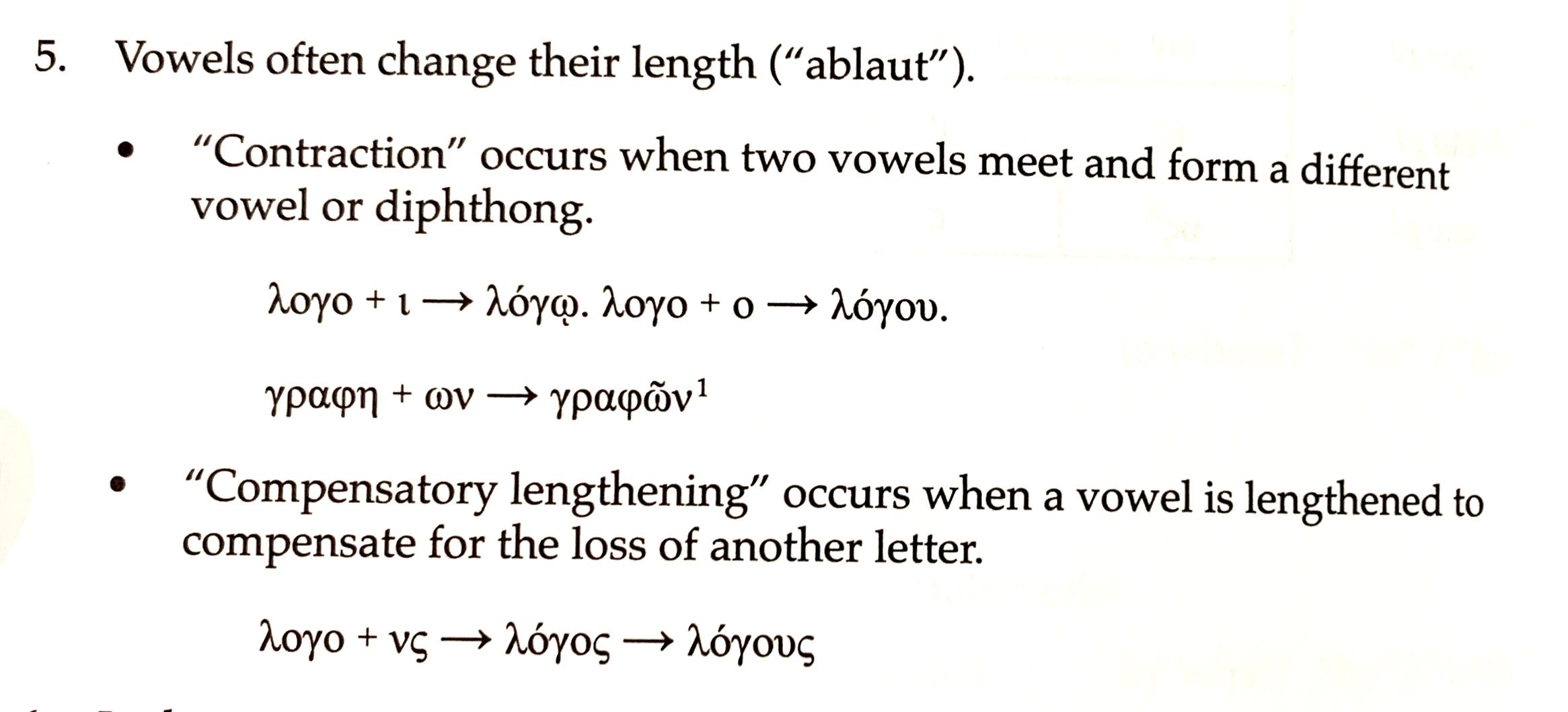Mounce’s Basics of Biblical Greek Grammar is a very popular modern textbook, with over 400,000 copies sold and now in its fourth edition. There’s a lot one could quibble with around the usual suspects of deponency, aspect, or the general grammar-translation approach but it’s particularly odd when basic (and, as far as I know, uncontroversial) terminology is misused or misunderstood. I’m talking in particular about the way “ablaut” is discussed.
Here’s one of his Eight Noun Rules on page 422 (BBG 4th Edition):

There are several problems here:
- “ablaut” is not simply “vowels changing their length”
- “contraction” is definitely not a form of ablaut
- “compensatory lengthening” is definitely not a form of ablaut either (certainly not in the example given, but see UPDATE)
So What is Ablaut?
More generally, vowel gradation is a grammatical alternation expressed via a vowel change. In English, sing ~ sang ~ sung expresses a contrast in tense-aspect; sing ~ song expresses a contrast in part of speech; foot ~ feet expresses a contrast in number.
Ablaut is a specific type of vowel gradation in Proto-Indo-European and many of its daughter languages. In PIE, it involved alternations between ∅ ~ e ~ o ~ ē ~ ō that were related, in part, to accentuation (∅ stands for the absence of the vowel, also called the ‘zero grade’).
Alternations in English like sing ~ sang ~ sung and sing ~ song can be traced to PIE ablaut. However, alternations like foot ~ feet (or man ~ men) are a different type of vowel gradation caused historically in Germanic languages by an -i that later dropped. This is called umlaut.
Because Greek had ablaut but not umlaut, the term “vowel gradation” is often used synonymously with “ablaut” when talking entirely about Greek. But technically ablaut is just one type of vowel gradation.
Ablaut is behind Greek alternations like λέγω ~ λόγος, πατήρ ~ πατέρα ~ πατρός, the theme vowel changes in -ο-μεν ~ -ε-τε, and the stem change in λείπ-ω ~ ἔ-λιπ-ον ~ λέ-λοιπ-α.
Contraction and compensatory lengthening are unrelated processes in Greek. They do involve vowel change, but not as part of a grammatical alternation.
Does Mounce Say Anything More About Ablaut?
On page 58 he again gives λογο + ι ➝ λογῷ as his example, describing “ablaut” as the “technical term” for the vowel length change. He further elaborates, saying that vowels can shorten (ω ➝ ο) or lengthen (ο ➝ ω) or disappear entirely. This explanation is somewhat okay, although λογῷ is bad example. Then in a footnote he talks about compensatory lengthening and says “this is a form of ablaut”. This is incorrect and misleading, because compensatory lengthening is not a form of ablaut or even vowel gradation. Ablaut (and vowel gradation) requires an alternation where the vowel difference signals something different grammatically.
On page 132 he describes the vocative singular as the bare stem “sometimes with the stem vowel being changed (ablaut)“. So he gets it right there even though the obvious example of second declension masculine vocatives in -ε (alternating with the ο in the nominative) contradicts his definition of ablaut as “vowels changing their length”.
On page 216, he says that “liquid roots (λ, μ, ν, ρ) are generally used without modification (except for ablaut)“. This is also a valid use of the term ablaut, but note that ablaut between verb stems is not just limited to liquid roots (I gave the example λείπ-ω ~ ἔ-λιπ-ον ~ λέ-λοιπ-α above).
Does This Actually Matter?
In terms of language acquisition, hundreds of millions of English speakers get by fine without knowing that sing ~ sang ~ sung is ablaut. Similarly it’s perfectly possible to learn Greek without even being consciously aware of all the alternations much less putting a label on them.
In this sense, students using BBG are hardly hurt by Mounce’s incorrect (or at the very least misleading) use of the term “ablaut”.
That said, Mounce’s textbook is a grammar and is used as students’ first introduction to Greek grammar in particular. Students should not be introduced to technical terminology in ways that are incorrect, and will require unlearning later on. Ablaut is neither a recent term (Jacob Grimm coined it 200 years ago and the concept was known to the Sanskrit grammarians two millennia ago) nor is it a contested term.
Thanks to Seumas Macdonald for his feedback on a draft of this post.
UPDATE: “I thought that πατήρ ~ πατέρα was compensatory lengthening from loss of sigma in nominative singular”. Some Greek grammars explain it this way and it’s potentially half-right. Many Indo-Europeanists (but not all) think that at an earlier stage, PIE *ph2-tḗr (from where πατήρ came) was probably *ph2-tér-s, thus keeping the nominative ending consistently -s at that earlier stage. This change *-VRs > *-VːR (where V is a vowel, Vː is a long vowel, and R is a resonant like r or n) is known as Szemerényi’s law. While this is broadly a type of compensatory lengthening it has no relationship to various compensatory lengthening processes in Greek itself and the three way alternation *ph2-tḗr ~ *ph2-tér-m̥ ~ *ph2-tr-és already existed in PIE before Greek.
Thus grammars that describe a three-way vowel grade alternation are correctly describing the situation in Greek. Those grammars that mention the possible earlier change in Indo-European should probably make it clear this not what is normally thought of as compensatory lengthening internal to Greek. And certainly none of this changes anything I’ve said about Mounce’s account.